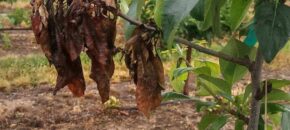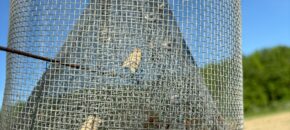Tomato spotted wilt virus (TSWV) has caused significant problems for some fresh-market tomato and pepper growers in New Jersey the past few growing seasons. TSWV has already been detected in tomato this growing season. Although TSWV is not uncommon, economic losses these past few years have been extensive on some farms. TSWV is vectored by […]
Continue reading...Fruit IPM Report May 26, 2025

Peach: Bacterial Spot: Copper formulations should be used starting at petal fall to suppress bacterial spot. Generally we recommend starting at 0.5 ozs metallic copper and gradually lowering the rate as the season progresses. The rate applied will depend on the formulation. Dr. Lalancette published a chart listing common copper formulations and rates for peach […]
Continue reading...Basil downy mildew found in New Jersey – ALERT 6/16/25
Basil downy mildew has been confirmed in greenhouse grown sweet basil in central New Jersey. This is the first confirmed report of BDM in the state and region this growing season. All basil growers are encouraged to scout their fields or greenhouses on a daily basis.
Continue reading...Controlling Rhizoctonia root rot
Rhizoctonia root rot has been reported over the past week. Rhizoctonia root rot, caused by Rhizoctonia solani, is an important soil-borne fungal pathogen with a very large host range. The pathogen can survive saprophytically on living or dead plant material (organic matter) or as sclerotia in the soil (for more than 3 years). Disease development […]
Continue reading...Beech Leaf Disease Twilight Meeting June 2nd – Registration OPEN

Beech Leaf Disease Twilight Meeting Click here to Register Exact address will be sent after registration Beech Leaf Disease Twilight – flyer Details: Monday June 2, 2025 5 – 7:30 pm RAIN DATE: June 3, 2025 Lewis Morris County Park, Morris Township NJ A light dinner will be provided COST: $25 About: Join experts Jean Epiphan […]
Continue reading...Vegetable IPM update 5/22/25

Greetings from the Veg IPM team! No major changes have taken place between last week and this week, and with the continuing rainy weather, scouting has been limited. Sweet Corn We’ve put out corn earworm pheromone traps throughout the state. While silking corn is the main target of CEW activity, we set the traps early […]
Continue reading...